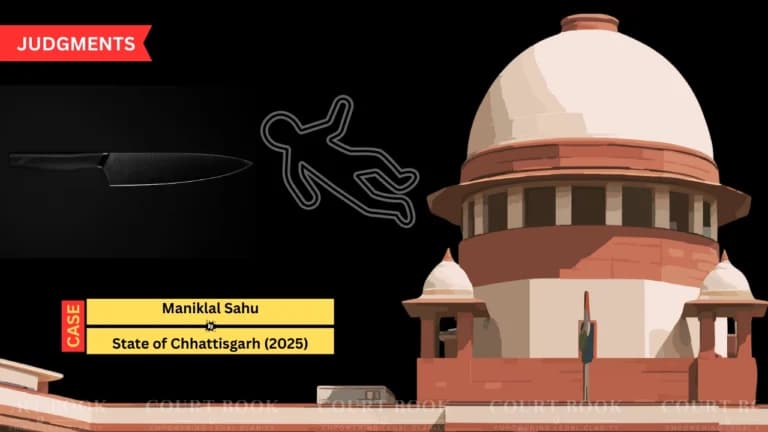The Supreme Court on Friday delivered a significant ruling in the case of Maniklal Sahu v. State of Chhattisgarh, where it reviewed whether the High Court erred in reducing a conviction from murder to attempt to murder. The case, arising from a brutal assault that later led to the victim’s death, saw the top court dissect issues of intent, medical causation, and delayed death due to complications.
Background
The case dates back to February 2022 in Bemetara, Chhattisgarh. According to the prosecution, Maniklal Sahu and three others stormed into the house of 22-year-old Rekhchand Verma, dragged him to the terrace, and threw him off. After that, they continued the assault with sticks and fists.
Rekhchand survived the initial attack but was left paralysed. He battled infections, pneumonia, and severe bedsores before succumbing in November 2022-nine months later. His dying declaration and testimony of doctors became the backbone of the prosecution’s case.
Initially, the trial court convicted all four under Section 302 (murder) of the IPC and sentenced them to life imprisonment. However, in July 2024, the Chhattisgarh High Court altered the conviction to Section 307 (attempt to murder) and reduced punishment to seven years’ rigorous imprisonment.
Court’s Observations
The bench led by Justice J.B. Pardiwala minced no words in criticising the High Court’s approach. “We must explain why the High Court is wrong in its view,” the judgment said.
Read also: Supreme Court Slams Karnataka Housing Board for 11-Year Delay, Restores Land Compensation Order to
The court stressed that death occurring months later due to septicemia or pneumonia cannot automatically sever the link between the assault and the fatality. “Every case has its unique fact situation. What matters is whether the injury was sufficient in the ordinary course to lead to death,” the bench noted.
Citing earlier precedents, the court emphasised that delayed complications-such as infections, paralysis, or septic shock-remain consequences of the original assault unless proven otherwise. “It would be no answer to a charge of death from violence to say that there was disease in the body of the victim unless the disease was the sole cause of death,” the judgment added.
The bench also dismissed arguments questioning the credibility of eyewitnesses, who were the victim’s brothers and mother. “There is no good reason for us to disbelieve or discard their evidence,” it held.
Read also: Supreme Court Orders Coal India to Refund 20% Excess Charges Collected Under 2006 Interim Coal Policy
Decision
Ultimately, the Supreme Court concluded that the High Court had committed a “gross error” in diluting the charge from murder to attempt to murder. However, since the State had not filed an appeal seeking restoration of the murder conviction, the top court refrained from overturning the High Court’s order.
The conviction under Section 307 IPC stands, with seven years’ rigorous imprisonment and fine, but the judgment carries a stern warning that courts must not casually downgrade murder charges when medical complications arise after prolonged treatment.
Case Title: Maniklal Sahu v. State of Chhattisgarh (2025)
Appeal No.: Criminal Appeal No. 5578 of 2024
Date of Judgment: 12 September 2025















